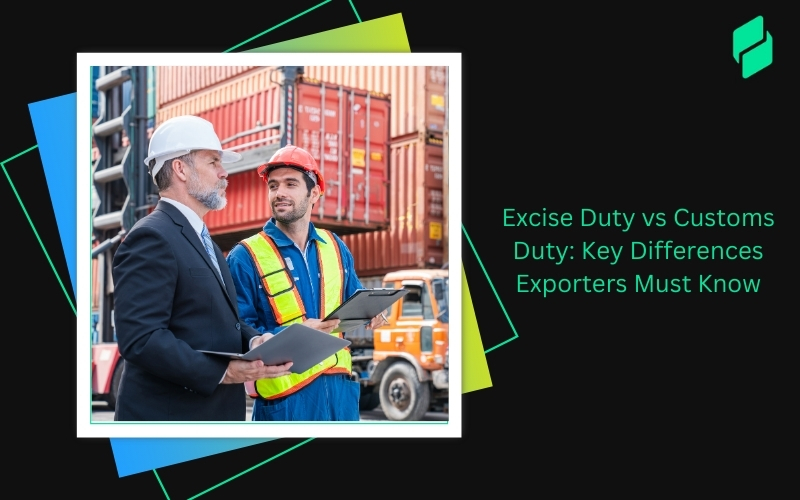Have you ever encountered a shipment delay due to customs issues? Understanding custom clearance charges in India is vital for a smooth import and export process.
This guide introduces the essentials of customs clearance, a key component of international trade. Compliance with global trade regulations is crucial, and customs clearance is the gatekeeper for goods crossing borders.
Whether experienced or new to the trade, this article offers valuable insights into navigating customs clearance in India, ensuring your shipments move seamlessly and comply with the law.
Optimize your business: use unlimited savings with Pazago fulfilled now!
Get Started ->What is Custom Clearance Charges?
Have you ever wondered what happens to your goods before they reach your doorstep from overseas?
The answer lies in the process known as customs clearance. It's the critical checkpoint where your goods must comply with the importing country's regulations before they can enter or leave.
The purpose is to ensure that goods meet all legal requirements, taxes and duties are paid, and the country is protected from prohibited items.
The heart of customs clearance lies in two key components: documentation and regulatory requirements. You'll need a range of documents, including a bill of lading, invoice, and packing list.
But it's not just about paperwork; understanding the regulatory landscape is equally important. Each country has its own set of rules, and staying updated is crucial for a smooth clearance process.
Now, let's talk about the consequences. Ignoring or overlooking these requirements can lead to significant headaches. Delays are the least of your worries. You could face hefty penalties or, worse, seizure of your goods. Imagine the impact on your business and reputation.
So, what's the takeaway? Customs clearance is not just a formality; it's an essential part of international trade. Understanding its intricacies can save you time, money, and a lot of trouble.
Now that we've unpacked the what and why of customs clearance, let's dive into when it comes into play.
When is Custom Clearance Charges Required?

Customs Clearance for Imports and Exports
Every international shipment to or from India must go through customs clearance. It's a mandatory step that ensures your goods are legally allowed to cross borders.
Compliance with Laws and Regulations
Customs clearance is a checkpoint to ensure your shipment adheres to the country's laws and regulations. It's about keeping trade secure and above board.
Verifying Contents and Assessing Taxes
Part of customs clearance involves verifying the contents of your shipment and assessing the appropriate taxes and duties. This step is crucial for maintaining fairness and transparency in trade.
Also Read: Understanding Customs Act 1962: A Comprehensive Guide
Documents Required for Custom Clearance Charges

1. Commercial Invoice
Think of the commercial invoice as the backbone of your customs clearance process. It's not just a bill; it's a detailed record of your transaction, including the value of the goods, description, and parties involved. This document is crucial for assessing duties and taxes, so accuracy is critical.
2. Packing List
Next up is the packing list. Do you need to unpack a suitcase and remember what you packed? The packing list prevents that scenario from happening in your shipment. It itemises every piece of cargo, helping customs officials verify the contents and ensure everything is accounted for.
3. Bill of Lading and Its Importance
The bill of lading is your shipment's ticket to ride. It's a contract between you, the carrier, and the receiver detailing the goods transported. This document is essential for claiming your shipment and proving ownership.
4. Certificate of Origin and Its Verification Process
The certificate of origin is like your goods' passport. It verifies where your products were made, which can affect duty rates and eligibility for trade agreements. Customs officials use this document to ensure compliance with trade regulations.
5. Export License for Specific Goods or Destinations
Some goods or destinations require an export license. It's like a permission slip, ensuring your shipment meets export control regulations. Check if your goods fall under these categories to avoid hiccups in the clearance process.
6. Understanding Other Possible Required Licenses and Permits
Lastly, other licenses and permits might be needed, depending on your goods or destination. These could include health certificates for food products or import permits for restricted items.
So, there you have it. Navigating the documents required for customs clearance might seem daunting, but you can make it a breeze with the correct information. Need help getting your documents in order? Pazago is here to assist! With our expert support, you can breeze through customs clearance with ease.
Have your documents sorted? Great! Let's walk through the customs clearance process step-by-step to ensure your full preparation.
Step-by-Step Custom Clearance Charges Process in India
Have you ever felt like you're in a labyrinth when dealing with customs clearance in India? Let's navigate this maze together, step by step, to ensure your shipments sail smoothly through customs.
1. Preparing for Customs Clearance: Document Preparation
First things first: preparation is essential. Before your shipment arrives, ensure all your documents are in order. This includes your commercial invoice, packing list, bill of lading, and other necessary paperwork. Having everything ready can save you time and headaches later on.
2. Arrival of Shipment and Initiation of Clearance Processing
Next, your shipment arrives, and the clearance process kicks off. It's like the starting gun in a race, signalling it's time to get to business. Your customs broker or agent will be your guide, ensuring that everything is for a smooth process.
3. Examination of Goods: Physical Inspection or Other Methods
Now, it's time for the examination of goods. This can be a nail-biting moment, as your shipment might undergo physical inspection. However, not all goods are inspected physically; some might use other methods like scanning. It's all about ensuring that what you've declared matches what's in the shipment.
4. Assessment and Payment of Duties, Taxes, Fees
After the examination comes the assessment and payment of duties, taxes, and fees. This is where the details of your commercial invoice and other documents play a crucial role. It's all about crunching the numbers and paying what's due to clear your goods.
5. Clearance and Delivery of Goods to Final Destination
Finally, the moment you've been waiting for clearance and delivery of goods to their final destination. It's like crossing the finish line in a race, with your goods successfully navigating the customs clearance process and ready to reach their new home.
Navigating the customs clearance maze can be daunting. With Pazago, you have a partner to guide you through every step, ensuring a smooth process from start to finish.
With tax matters clear, let's shift gears and focus on essential tips for navigating customs clearance like a pro.
Custom Clearance Charges Fees in India
Customs duty is a critical aspect of international trade, and the federal government charges it for importing and exporting goods in India.
When it comes to imports, customs duty calculation involves several components. The primary taxes include Basic Customs Duty (BCD), Social Welfare Surcharge, and Integrated Goods and Services Tax (IGST).
- Basic Customs Duty (BCD): This is the standard duty applied to imported goods, which varies depending on the HS code.
- Integrated Goods and Services Tax (IGST): This tax is based on the value of the goods plus the BCD and is applied to imported goods.
- Social Welfare Surcharge: A percentage of the BCD funding social welfare initiatives.
BCD can be levied in two ways: a specific rate based on the unit of the item (e.g., weight, number) or, more commonly, an ad-valorem rate based on the assessable value of the item. In some cases, a combination of both methods is used.
The peak customs duty in India currently stands at around 10%, which means that the highest essential duty imposed on the most significant number of imported goods is 10%.
The Social Welfare Surcharge is 10% of the value of goods and funds social welfare initiatives.
IGST is a value-added tax levied in the state where the imported goods are consumed. It can be set off at each stage until the goods are sold to the ultimate consumer.
Here's an example of how to calculate the total tax you need to pay on an imported package shipped under CIF and subject to basic customs duty, social welfare surcharge, and IGST.

Types of Fees Associated with Customs Clearance

In addition to the primary taxes, several other fees and duties may be applicable, depending on the nature of the goods being imported:
- Anti-dumping Duty is imposed if the goods being imported are below fair market price to protect domestic industries from unfair competition.
- Safeguard Duty: This duty is liable if a sudden import increase could damage the domestic industry.
- Customs Handling Fee: A fee of 1% is levied for handling and processing customs documentation and shipments.
- Compensation Cess: This cess is imposed on certain notified goods considered to be 'sin' or 'luxury' goods. For example, SUV vehicles (more than 4 meters) are charged 50% GST, of which the GST tax rate is 28%, and the compensation cess is 22%. This cess is applicable in addition to regular GST.
Are you worried about calculating and managing customs fees? Pazago's expertise can help you accurately estimate and optimise these costs, ensuring no surprises.
Things to Keep in Mind for Successful Custom Clearance Charges
Self-Assessment and Understanding of Duties
Are you navigating the maze of customs clearance? Start with a solid understanding of the duties and taxes applicable to your goods. Self-assessment is crucial.
Knowing the details of Basic Customs Duty, Social Welfare Surcharge, and IGST can prevent unexpected costs and delays. Equip yourself with knowledge, and you're already halfway to success.
Importance of Accurate and Complete Documentation
Ever heard the saying, "The devil is in the details"? This holds for customs clearance. Accurate and complete documentation is your best defense against clearance hurdles. Ensure that your commercial invoice, packing list, and bill of lading are in perfect order.
A single discrepancy can lead to delays, penalties, or even the seizure of goods.
Proactive Communication with Customs Authorities
Communication is critical, especially when it comes to customs clearance. Being proactive in your interactions with customs authorities can make a difference.
Address queries promptly, provide additional information when required, and maintain a cooperative attitude. Building a positive rapport with customs officials can facilitate smoother clearance and quicker resolution of any issues.
Role of Customs Brokers or Freight Forwarders
Are you feeling overwhelmed? Consider enlisting the help of customs brokers or freight forwarders like Pazago. These professionals are well-versed in the intricacies of customs regulations and can navigate the clearance process on your behalf.
They can handle documentation, liaise with customs authorities, and ensure that your goods clear customs efficiently. Think of them as your trusted allies in international trade.
Timing Considerations for Document Preparation and Inspections
Time is of the essence in customs clearance. Plan to ensure that all documents are prepared well in advance of your shipment's arrival.
Remember that required inspections can add time to the clearance process. Factor in potential delays and aim for a buffer period to avoid last-minute rushes and ensure timely delivery of your goods.
Conclusion
Navigating customs clearance in India is crucial for seamless international trade. Understanding customs clearance fees, including Basic Customs Duty, Social Welfare Surcharge, and IGST, is essential for compliance and budgeting. Accurate documentation and proactive communication with customs authorities are vital to avoiding delays.
Enlisting professionals like customs brokers or freight forwarders like Pazago can simplify the process. Timing is crucial, so plan for document preparation and inspections.
By following these tips, you can ensure efficient customs clearance, avoid potential hurdles, and ensure timely delivery of your shipments.


.png)








